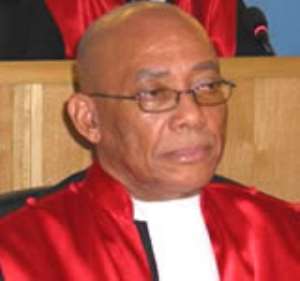
The Commissioner, Commission of Human Rights and Administrative Justice (CHRAJ), Emile Short, says prisoners should not be seen as outcasts.
He said stigmatizing people who have been to jail only serves to isolate them and make it more difficult for them to adjust in the society.
He was contributing to discussions on the need to decongest the country's prisons and the neglect suffered by many remand prisoners whose number far outnumbers that of convicted prisoners.
Mr Short told Joy FM's Super Morning Show host Kojo Oppong-Nkrumah that once a person has had a brush with the law “then you are to be shunned, avoided and stigmatized.”
But “people can go into prison for all sorts of reasons and also don't forget that there are many people who have come out of prison reformed… and indeed… many people who go to prison find the time to seek God and to find some sort of spiritual solace… and they must be given a chance” instead of society viewing them with suspicion and deep mistrust.
The CHRAJ boss reminded the society that it was pretty easy for anybody to end up in prison “because if you are caught in a situation which has an appearance of criminality, you may be picked up by the police…and also you must remember that sometimes when someone goes to the police and makes a complaint, the complaint may be mischievous, it may have no foundation whatsoever, but the police will pick you up and then you would have to spend time in prison either as a remand prisoner or if you are not lucky you will be tried and convicted.”
He emphasised that there had been many situations where people have been accused of crimes and it has turned out that they are innocent “so the possibility of innocent people being convicted is quite real.”
“I think that is the more reason why we should have a very objective approach towards people on remand and we should not assume that once you have been arrested then you are a criminal,” Mr Emile Short stated.
He expressed regret that past and present governments had not mustered the required political will to reform the country's criminal justice system.
But the blame, he said, is not the politician's alone, but the entire society's, which has failed to exert the needed pressure on the decision makers to act proactively on the subject.
Mr Short noted that even though over the past 10 years non-custodial sentencing had been strongly advocated, the system was still not applied, worsening the congestion in the country's prisons.
Many people, he said, “don't appreciate the traumatic effect of deprivation of liberty especially when you are detained in very horrific conditions. For example where the remand prisoners are kept, there is intense heat, and the congestion is just unimaginable and they are not allowed to go out to the compound. And so when you are subjected to such degrading and inhuman treatment, bitterness begins to swell up in your heart and you come out vengeful against society.”
The CHRAJ Commissioner emphasised the need for urgent measures to be put in place to reverse the current trend in the prisons.
On Monday, he led officials of the commission and journalists on a tour of the Nsawam Medium Prison where it was discovered that prisoner population was over four times more than its capacity.
Story by Malik Abass Daabu/Myjoyonline.com/Ghana




 Saglemi Housing Project will not be left to rot – Kojo Oppong Nkrumah
Saglemi Housing Project will not be left to rot – Kojo Oppong Nkrumah
 Transport fares hike: GPRTU issue two-day ultimatum
Transport fares hike: GPRTU issue two-day ultimatum
 ARC endorses Alan as presidential candidate – Buaben Asamoa
ARC endorses Alan as presidential candidate – Buaben Asamoa
 Akufo-Addo appoints Kwasi Agyei as new Controller and Accountant-General
Akufo-Addo appoints Kwasi Agyei as new Controller and Accountant-General
 PNC dismiss reports of mass resignations
PNC dismiss reports of mass resignations
 PAC advocates for revenue collectors to be engaged on commission basis, not full...
PAC advocates for revenue collectors to be engaged on commission basis, not full...
 Genser Energy commissions 110km of natural gas pipeline at Anwomaso
Genser Energy commissions 110km of natural gas pipeline at Anwomaso
 Naa Torshie calls for tolerance, peace ahead of 2024 election
Naa Torshie calls for tolerance, peace ahead of 2024 election
 Asantehene commends Matthew Opoku Prempeh for conceiving GENSER Kumasi Pipeline ...
Asantehene commends Matthew Opoku Prempeh for conceiving GENSER Kumasi Pipeline ...
 Let’s do away with ‘slash and burn politics’ in Ghana — Dr Adutwum
Let’s do away with ‘slash and burn politics’ in Ghana — Dr Adutwum
